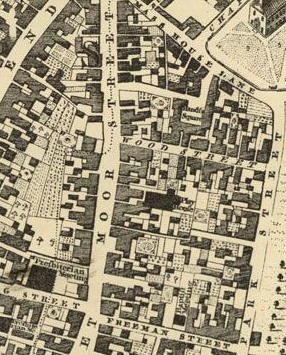Moor Street Theatre on:
[Wikipedia]
[Google]
[Amazon]
 The Moor Street Theatre was the first regular
The Moor Street Theatre was the first regular
 The Moor Street Theatre was the first regular
The Moor Street Theatre was the first regular theatre
Theatre or theater is a collaborative form of performing art that uses live performers, usually actors or actresses, to present the experience of a real or imagined event before a live audience in a specific place, often a stage. The perform ...
– as distinct from earlier booths and converted barns for strolling players – to be established in Birmingham
Birmingham ( ) is a City status in the United Kingdom, city and metropolitan borough in the metropolitan county of West Midlands (county), West Midlands in England. It is the second-largest city in the United Kingdom with a population of 1. ...
, England
England is a country that is part of the United Kingdom. It shares land borders with Wales to its west and Scotland to its north. The Irish Sea lies northwest and the Celtic Sea to the southwest. It is separated from continental Europe b ...
. Located in a back yard between Moor Street and Park Street north of the Bull Ring, it opened in 1740 with a performance of "Oratorio with Vocal and Instrumental Musick".
Although the theatre was not purpose-built for dramatic performances, surviving records show that it had boxes, a pit, a balcony and two galleries, together with significant backstage machinery, suggesting that it was a substantial structure. Plays were performed on Monday, Wednesday and Friday evenings between July and October. During cold weather the theatre was heated by burning fires for two days before a performance.
Like all early Birmingham theatres the Moor Street Theatre was not licensed for dramatic performance, so technically charged for the performance of music during the interval - the play itself being given free of charge. The top seat prices of 2 shillings and 6 pence suggest a well-off audience and, following the lead of David Garrick, performances were given in costumes "proper to the play".
The theatre was managed by John Ward during the 1740s, who had established Birmingham's first professional theatre company – the Warwickshire Company of Comedians – by 1744. A visit in 1751 by Richard Yates and 'His Majesty's Servants from the Theatres Royal in London' – essentially the company from the Theatre Royal, Drury Lane
The Theatre Royal, Drury Lane, commonly known as Drury Lane, is a West End theatre and Grade I listed building in Covent Garden, London, England. The building faces Catherine Street (earlier named Bridges or Brydges Street) and backs onto Dr ...
– was so successful that Yates' company was installed permanently in the theatre, and two years later Yates was encouraged to open the much larger King Street Theatre. The Moor Street Theatre was increasingly unable to compete and closed in 1763.
The composer Barnabas Gunn promoted orchestral concerts at the theatre from 1740, the earliest secular classical music concerts recorded in Birmingham.
The existence of two theatres in the town had been controversial with Birmingham's religious non-conformists. When the closed Moor Street Theatre was converted into a Methodist
Methodism, also called the Methodist movement, is a group of historically related denominations of Protestant Christianity whose origins, doctrine and practice derive from the life and teachings of John Wesley. George Whitefield and John's ...
chapel in 1764, John Wesley preached how "Happy would it be, if all playhouses in the kingdom were converted to so good an use", though some elements of the town evidently disagreed, and stoned the congregation as they left.
References
Bibliography
* * * * * * {{coord, 52.4802, -1.8912, type:landmark_region:GB, display=title Former theatres in Birmingham, West Midlands